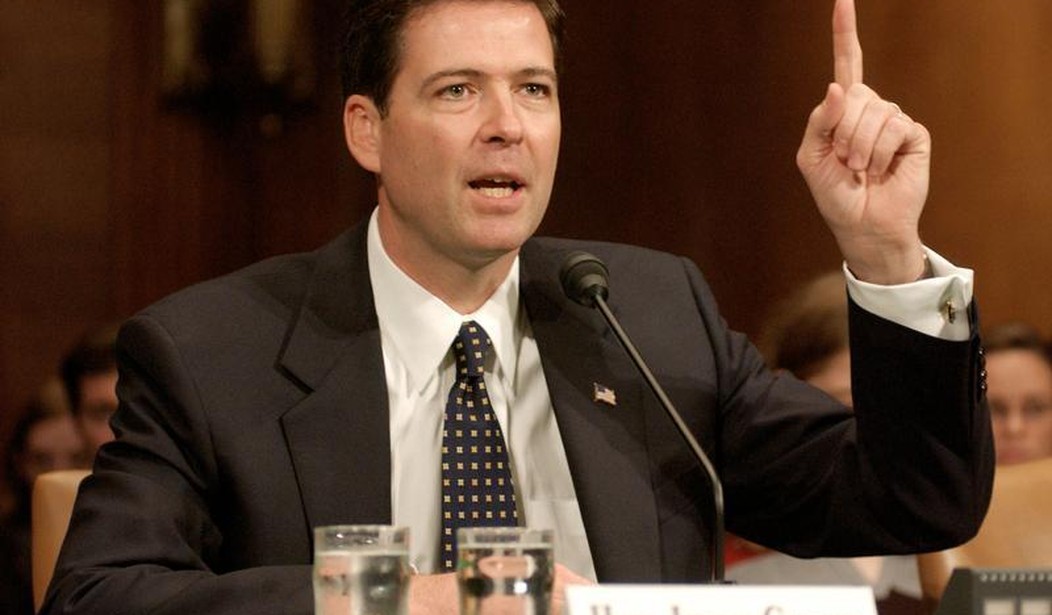WASHINGTON — The Senate ushered in a new chief for the Federal Bureau of Investigation today, with Sen. Rand Paul (R-Ky.) casting the lone dissenting vote against James B. Comey and two privacy-rights Democrats refusing to vote yea or nay.
Comey, who was deputy attorney general for two years in the George W. Bush administration, replaces FBI Director Robert Mueller after his 12 years at the helm of the Bureau.
The 93-1 confirmation vote marks the first “no” vote for an FBI director nominee since the Senate was first charged with approving the chief in 1968.
It all came down to drones as Paul placed a hold on Comey’s nomination, which cleared the Senate Judiciary Committee on July 18. Privacy advocate Sens. Ron Wyden (D-Ore.) and Jeff Merkley (D-Ore.) cast “present” votes on the floor today.
President Obama issued a statement applauding “the overwhelming, bipartisan majority of senators who today confirmed Jim Comey to be the next director of the FBI.”
“Jim is a natural leader of unquestioned integrity. In the face of ever-changing threats, he has repeatedly demonstrated his commitment to defending America’s security and ideals alike. With Jim at the Bureau’s helm, I know that the FBI will be in good hands long after I’ve left office,” Obama said.
Paul, though, protested that the American people won’t be in good hands as long as there are outstanding questions on privacy protections from domestic drone use — the issue that sparked his famous 13-hour filibuster.
Paul sent letters to Mueller on June 20 and July 9 over concerns about confirmation from the bureau in testimony before Congress that the FBI operates drones within the U.S.
“Given that drone surveillance over American skies represents a potentially vast expansion of government surveillance powers without the constitutionally-guaranteed protection of a warrant, it is vital that the use of these drones by the FBI be fully examined in an open and transparent manner,” Paul wrote in the July 9 letter. “The American people have a right to know the limits that the federal government operates under when using these drones, and whether further action by Congress is needed to protect the rights of innocent Americans.”
The senator promised that without “adequate answers” to his “easily answerable,” “legitimate questions on important government functions,” he’d object to the consideration of Comey’s nomination.
Paul received some answers on July 19, both classified and not, and wasn’t satisfied.
“The FBI uses UAVs in very limited circumstances to conduct surveillance when there is a specific, operational need,” read the unclassified letter from Assistant Director Stephen D. Kelly, offering examples of finding missing children and drug interdictions.
“In addition, every request to use UAVs for surveillance is reviewed by FBI legal counsel to ensure there are not potential Fourth Amendment or privacy concerns implicated by the proposed use of UAVs,” Kelly continued. “Every request to use UAVs for surveillance must be approved by senior FBI management at FBI Headquarters and in the relevant FBI Field Office. Without a warrant, the FBI will not use UAVs to acquire information in which individuals have a reasonable expectation of privacy under the Fourth Amendment.”
Paul seized on that “reasonable expectation” clause in his response to Mueller.
“Of note, the Bureau’s response also mentions that ‘there has been no need’ to seek a warrant or court order to use a drone in past examples,” he wrote the director on July 25. “Instead of seeking court orders, the Bureau defers to an internal approval process it uses to protect privacy. Given that, first, the FBI will only seek a warrant if a reasonable expectation of privacy is assumed and, second, that the FBI has not felt it necessary to seek a warrant during past drone operations, it is important that you clarify your interpretation of when an individual is assumed to have a reasonable expectation of privacy.”
“I am concerned that an overbroad interpretation of this protection would enable more substantial information collection on an individual in a circumstance they might not have believed was subject to surveillance.”
Paul wanted Mueller to follow up with the Bureau’s definition of a “reasonable expectation of privacy,” including examples of how it might be defined in training manuals or department memos.
Kelly responded today that “all FBI agents are trained on the Supreme Court’s interpretations of a reasonable expectation of privacy under the Fourth Amendment, and on the circumstances where the FBI would be required to seek a warrant during an investigation.”
He argued that three cases of manned aerial surveillance heard by the Supreme Court “held that aerial surveillance was not a search under the Fourth Amendment requiring a warrant because the areas observed were open to public view and, as a matter of law, there was no reasonable expectation of privacy.”
“The Fourth Amendment principles applicable to manned aerial surveillance discussed in these cases apply equally to UAVs,” Kelly continued. “…With respect to UAVs, there is no physical trespass involved in their use, and a warrant would not be required under this standard.”
Paul said the response wasn’t to his liking, but acknowledged that the FBI did respond to his questions.
“The FBI today responded to my questions on domestic use of surveillance drones by saying that they don’t necessarily need a warrant to deploy this technology. I disagree with this interpretation,” said Paul. “However, given the fact that they did respond to my concerns over drone use on U.S. soil, I have decided to release my hold on the pending FBI director nominee.”
Wyden, the sole Democrat to lend Paul a hand during his March filibuster of John Brennan’s nomination, said he voted “present” despite the “unfortunate fact that the FBI’s surveillance authorities have been famously abused in previous decades.”
“After reviewing the record of Mr. Comey’s confirmation hearing and meeting with him in person, his views on surveillance policy and law remain unclear to me. I sent Mr. Comey a letter asking for written responses to several important questions on surveillance, including whether he believes warrantless wire tapping is legal, and whether he would commit to explain how much evidence the FBI needs to track Americans using their cell phone location data,” Wyden said.
That included questions about “the NSA’s ongoing dragnet collections of Americans’ phone records” and whether Comey felt that had any impact on privacy rights.
“Mr. Comey could have answered most or all of these questions without disclosing any properly classified information, but the Justice Department informed me today that he will not be responding to any of them,” Wyden continued. “I hope that Mr. Comey will turn out to be a wise and appropriate choice to head the FBI but without more information about his views on these important questions, I cannot vote to approve his nomination at this time.”
In that letter, Peter J. Kadzik, principal deputy assistant attorney general, said Comey would work with senators if confirmed.
“Mr. Comey has not been informed about the details or value of any programs currently employed by intelligence agencies to protect our national security,” Kadzik wrote Wyden. “He has, however, pledged that, if confirmed, he will work to accommodate the needs of the relevant congressional oversight committees, consistent with the FBI’s law enforcement and national security responsibilities.”
“We hope that this information is helpful,” the DOJ official added.









Join the conversation as a VIP Member